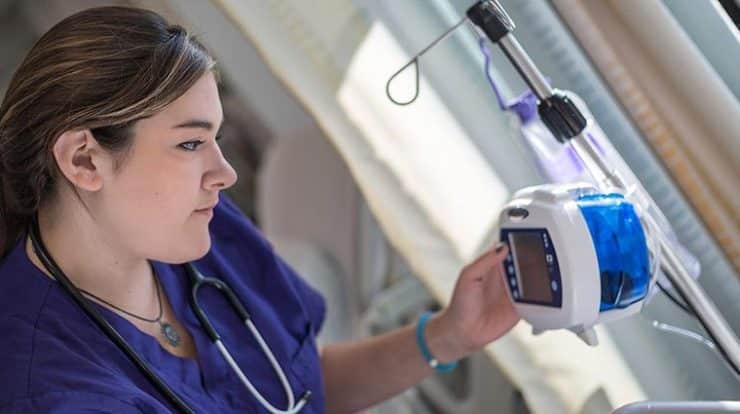Many people believe that nurses only work at hospitals and clinics, but they actually work in a variety of settings and organizations such as school campuses, community health clinics, and urgent care clinics. People who pursue nursing have a lot of options for building a career. Nurses are so diverse in their experiences that they can be as effective as doctors in administering proper care to their patients. Most of the people who have had experiences with illnesses or accidents requiring medical intervention also believe nurses to be very qualified.
A very big reason for this is the amount of time nurses spend around patients. Once a doctor has given a diagnosis and figured out the recovery plan, they leave while the nurses stay on and monitor the patient around the clock. They know and understand patients much more intimately compared to doctors, which is why they are such vital members of society. While the work that they do thanks to their medicinal knowledge is very important, nurses also bridge the gap that exists between doctors and the members of the community who need care.
How nurses are important to a community
Nurses play a very big role in the success of any community because in their absence, medical care would be in chaos. This was made clear during the coronavirus pandemic; if nurses had not stepped up as frontline warriors, mortality rates could have been significantly worse. Before we move on to how nurses serve communities, let’s discuss the concept of community nursing.
Community nursing
In the past, nurses had very few options for their careers, being largely limited to hospitals and public health departments. Now, we have nurses who don’t even have to work directly with patients. These are what we call community nurses because their job combines healthcare with taking care of a community.
These nurses add to the overall area where they work. Their goal is to make sure that the people who make up the community are healthy, have adequate resources and access to proper medical care. Community nurses do need to be registered nurses, which means that they go through the same level of education and training as any other nurse, if not more. In fact, registered nurses often choose to work as community nurses because they have the necessary experience and are the most qualified to occupy these positions.
Here are some of the ways nurses help shape better communities.
They provide preventative care
Many of the problems that people suffer from in terms of health can be avoided or delayed by taking care of themselves. If people focus on their physical fitness, have a good diet and keep active during their formative years, they can escape from many age- and weight-related problems.
Prevention is better than treatment. This is where nurses shine because they provide excellent preventative healthcare to people. They do a lot of screening work, impart valuable education to patients by explaining healthy choices, provide vaccinations, and keep tabs on vital signs. Nurses help prevent their communities from getting ill for as long as they can. Even in the case of patients who receive a serious diagnosis such as cancer, nurses work to prevent their conditions from deteriorating.
This also makes nurses excellent advocates for community health. While they do preventative and education work, they also understand the pain points of the community they serve. They know what limitations are inhibiting people from living a well-rounded, healthy lifestyle, such as poor access to healthy food or the income disparities among working people that prevent them from having better lifestyles. They have the chance to work with governmental agencies and other services to help bring the necessary changes to protect the health of the community.
They build bridges
Nurses are essentially coordinators, maintaining communication between all the stakeholders in a healthcare system. They are the ones who not only know what sort of care the patient needs but also where they can receive it.
Many people require long-term care outside of their hospital journey. Nurses have the power to connect these people to the required therapists, specialists and services. This means they add a lot of value to their communities, even after a patient has been discharged from their care.
They can influence policies
Because their job requires them to work so closely with patients, nurses can be very good advocates for changes in the health policies of a community. They have knowledge, are highly educated and know firsthand what sick or injured people experience. Their voices matter and have the power to make legislative differences on a governmental level, especially in communities that have marginalized people or a lack of proper resources.
Becoming a nurse practitioner is a useful step for those who wish to influence healthcare policy, and institutions like Spring Arbor University offer high-quality online degree programs that allow nurses to advance their careers while working.
Because of their advocacy, NPs have the chance to establish a communication channel with the people in the community they care for, thereby building up trust so they can open up about their problems. Often people choose not to come forward with their grievances because they feel no one cares enough to listen. This is why nurses are the best possible representation when it comes to poor or inadequate health management in a community.
Their own community benefits from them
Another interesting perspective to discuss here is how nurses actually contribute to the prosperity and success of their own network of nurses. As is the case with all great professions, there are pioneers who lead the way. Many experienced and qualified nurses have fought very hard with the government for their right to have full practice authority. Right now, only 24 states allow nurses to have full practice authority. This enables them to make medical decisions for their patients without consulting a doctor. If the nurses did not fight for their autonomy rights, even these 24 states would not have this privilege.
Many experts believe it is not reasonable for nurses to have to seek approval for every decision they make because they go through proper academics and training to be where they are. Taking care of patients and coming up with solutions is second nature to them.
It should be noted that asking for a doctor’s approval doesn’t diminish a nurse’s performance; doctors are indeed the most qualified to make these decisions. However, it wastes a lot of valuable time by reducing the coverage of care that can be provided in the presence of decision-making autonomy.
They have more access to people
More nurses than doctors travel to and work in rural locations and see patients who don’t have access to high-quality medical care. If you look at the variety of places nurses are qualified to work for, you will realize that doctors are seldom found in some of them. Nurses are also more prepared to take a look at patients who lack insurance.
Nurses’ access to all types of people belonging to different socio-economic backgrounds makes it possible for them to be the primary caretakers in these settings. Many communities would suffer without access to nurses.
Conclusion
Unfortunately, nurses are not praised as much as doctors are, and many people don’t even want to think of nursing as an equally challenging and respectable profession.
However, it is a very diverse job because nurses do not just look after sick people; they look after an entire community. Even the nurses who don’t become community nurses in their careers do all of this work in their daily lives, albeit on a smaller scale. The next time you see a nurse for any reason, don’t forget to thank them for their work. Nurses need to know that they are superheroes and the work that they do changes lives for the better!








